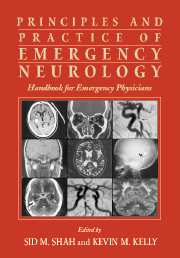Book contents
- Frontmatter
- Contents
- Preface
- Contributors
- SECTION I NEUROLOGICAL EXAMINATION AND NEURODIAGNOSTIC TESTING
- SECTION II COMMON NEUROLOGICAL PRESENTATIONS
- SECTION III SPECIFIC NEUROLOGICAL CONDITIONS
- 11 Central Nervous System Infections in Adults
- 12 Cerebrovascular Disease
- 13 Movement Disorders
- 14 Peripheral Nervous System and Neuromuscular Disorders
- 15 Guillain-Barré Syndrome
- 16 Myasthenia Gravis
- 17 Musculoskeletal and Neurogenic Pain
- 18 Neuro-Ophthalmological Emergencies
- 19 Multiple Sclerosis
- 20 Dementia
- 21 Brain Tumors and Other Neuro-Oncological Emergencies
- 22 Neuropsychiatry
- 23 Increased Intracranial Pressure and Herniation Syndromes
- 24 Idiopathic Intracranial Hypertension
- 25 Normal Pressure Hydrocephalus
- 26 Nontraumatic Spinal Cord Emergencies
- 27 Sleep Disorders
- SECTION IV NEUROLOGICAL TRAUMA
- SECTION V PEDIATRIC NEUROLOGICAL EMERGENCIES
- SECTION VI PREGNANCY-RELATED NEUROLOGICAL EMERGENCIES
- SECTION VII NEUROTOXICOLOGY
- SECTION VIII BRAIN DEATH
- Index
20 - Dementia
from SECTION III - SPECIFIC NEUROLOGICAL CONDITIONS
Published online by Cambridge University Press: 06 August 2009
- Frontmatter
- Contents
- Preface
- Contributors
- SECTION I NEUROLOGICAL EXAMINATION AND NEURODIAGNOSTIC TESTING
- SECTION II COMMON NEUROLOGICAL PRESENTATIONS
- SECTION III SPECIFIC NEUROLOGICAL CONDITIONS
- 11 Central Nervous System Infections in Adults
- 12 Cerebrovascular Disease
- 13 Movement Disorders
- 14 Peripheral Nervous System and Neuromuscular Disorders
- 15 Guillain-Barré Syndrome
- 16 Myasthenia Gravis
- 17 Musculoskeletal and Neurogenic Pain
- 18 Neuro-Ophthalmological Emergencies
- 19 Multiple Sclerosis
- 20 Dementia
- 21 Brain Tumors and Other Neuro-Oncological Emergencies
- 22 Neuropsychiatry
- 23 Increased Intracranial Pressure and Herniation Syndromes
- 24 Idiopathic Intracranial Hypertension
- 25 Normal Pressure Hydrocephalus
- 26 Nontraumatic Spinal Cord Emergencies
- 27 Sleep Disorders
- SECTION IV NEUROLOGICAL TRAUMA
- SECTION V PEDIATRIC NEUROLOGICAL EMERGENCIES
- SECTION VI PREGNANCY-RELATED NEUROLOGICAL EMERGENCIES
- SECTION VII NEUROTOXICOLOGY
- SECTION VIII BRAIN DEATH
- Index
Summary
Keywords
Information
- Type
- Chapter
- Information
- Principles and Practice of Emergency NeurologyHandbook for Emergency Physicians, pp. 218 - 225Publisher: Cambridge University PressPrint publication year: 2003
